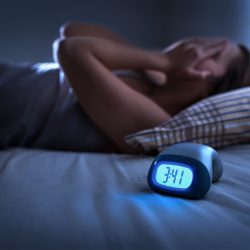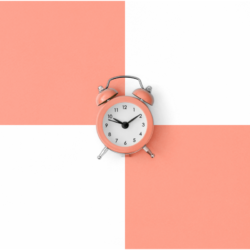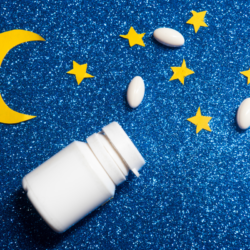The time change is not always a pleasant experience for everyone… The sudden change in time throws our internal clock out of kilter and ultimately affects our entire metabolism. This can lead to sleep disturbances, and even disrupt our appetite and mood. Did you know that some people can take more than ten days to rebalance their biological clock? This could be the case for you… Find out all our tips in this article for keeping a good night’s sleep when the clock changes.
The first things to do when the time changes
→ Resetting the clocks:
First of all, it’s a good idea to prepare yourself psychologically for the time change and get yourself as conditioned as possible. To do this, it may be a good idea to synchronise all the dials in the house the day before.
→ Opt for light therapy:
When winter time changes, it’s often still pitch black when you wake up. To avoid disrupting your internal clock, you can opt for light therapy. You can use a dawn simulator, for example.
→ Wake up at the usual time:
The time change always takes place on a Sunday. It’s true that it’s tempting to take advantage of that extra hour of sleep to sleep in. Yet it’ s better to wake up at the same time as usual.
→ For the little ones:
As far as our children are concerned, on the day of the time change, they may find it difficult to go to bed. Yet their internal clocks are running later than usual. Boosted by their extra hour’s sleep if they’ve slept in, and disturbed by the change, they may be too worked up to fall asleep.
The best solution is to let off steam and tire them out in a healthy way on the day of the time change and in the week that follows. You can plan more outdoor activities: bike rides, a longer outing to the park, etc.
Good sleep goes hand in hand with a healthy lifestyle
With the summer time change, it’s vital to listen to yourself and your body’s needs. We all have a daily rhythm that is most favourable to us. It’s up to us to identify it and stick to it as much as possible.
Simply observe yourself. What time in the evening do you feel the urge to go to sleep? What time do you wake up naturally? How many hours of sleep do you need to get through the day in top form? These few simple questions can teach you a lot about how to improve your sleep and your health.
We all know that too much time spent in front of our screens is harmful. Repeated stimulation is a source of emotional and mental agitation. Similarly, days spent under stress, without taking the time to rest, eat properly and breathe deeply will have a negative impact on our sleep.
So, to help our bodies adjust to their natural rhythms, it’s important to take breaks during the day , to relax, to breathe and to unwind. A siesta has a beneficial effect on regulating our biological rhythm.
Physical exercise, done in moderation and during the day, is a good sleep inducer.
Think about the environment in which you sleep: the room should be airy, with pleasant, light colours, and ideally at a temperature of 18°C. Save yourself from the waves from your mobile phone by switching it off and leaving it in another room. Avoid all electromagnetic fields that could disturb your sleep. Pay attention to the quality of your bedding, use natural, pleasant materials for your linens and create an atmosphere conducive to calm.
Having trouble falling asleep? As is often done with children, you can introduce a bedtime ritual: read a few pages of a book, listen to music you like, review the day in a positive way, etc.
Finally, for those who find it hard to relax in the evening, consider the benefits of a warm bath scented with a few drops of essential oils. You can also light a few candles, do some deep breathing, give yourself a massage or have one given to you.
When the clock changes, look after your diet
And not just at the time change! But it’s true that it’s important to look after your diet, especially at this time of year, to avoid sleep problems.
With this in mind, the evening meal should be taken as early as possible and should be light. Remember that the first meal of the day is a breakfastwhich means that your body must have fasted since the day before! Adopting this good habit will help you avoid a number of inconveniences: heavy and difficult digestion , poor recovery of the body and incomplete elimination of toxins during the night, leading to restless sleep and difficult waking.
This is why the evening meal should not include heavy proteins. Instead, eat raw and cooked vegetables, soups or a small amount of cereals or pulses.
Foods rich in tryptophan, the precursor of serotonin (bananas, parsley, pumpkin seeds, soya, cod, milk) will have their place in your diet.
By stimulating insulin secretion, carbohydrates facilitate the absorption of tryptophan and its conversion into serotonin.
On the other hand, certain foods are not condu cive to good quality sleep; in general, foods that require too much digestive effort. This means avoiding excess protein, fried foods and bad food combinations. Foods that you don’t tolerate well or that are too strong” should also be reduced, especially in the evening: spices, garlic, onions, etc
But reducing or even eliminating stimulating foods will also have a positive impact on sleep. Tea, coffee, alcohol, soft drinks and energy drinks should be avoided at all costs!
Herbal tea in the evening is highly recommended. It will give you time to relax while providing you with active plant ingredients that are good for sleep: hawthorn, lemon balm, lime blossom, verbena, orange blossom, camomile, passionflower and valerian all have sedative properties and a specific sphere of action. Eschscholtzia is also a major plant for sleep quality.
The quality of your microbiota affects the quality of your sleep… And vice versa!
For 23 years, the 3rd Friday in March has been dedicated to World Sleep Day. In France, this awareness-raising day is organised by the Institut national du Sommeil et de la Vigilance (InSV). This year, the focus is on mental health, eco-anxiety and sleep-related beliefs.
On average, we spend a third of our lives asleep. The Inserm dossier highlights the importance of good quality sleep for good health:
- In adolescents, insufficient sleep is correlated with a smaller volume of grey matter,
- Nights of less than 6 hours increase the risk of type 2 diabetes by 28%
- Poor quality sleep increases the risk of cardiovascular disease.
- A night that’s too short already brings immediate risks: mood disorders, reduced attention span and problems with alertness.
These figures are cause for concern, given that 1 in 3 people in France claim to suffer from sleep disorders, and the Covid 19 pandemic has done nothing to help. At the start of the containment period in March 2020, sleep disorders were affecting around two-thirds of the working population, affecting women more than men.
The importance of sleep for pregnant women and the health of their children
While sleep duration varies according to individual and age (from 16 hours for a newborn to an average of 8 hours for an adult), pregnancy is a period when sleep is altered. 97% of pregnant women say they wake up an average of 3 times a night at the end of pregnancy. Hormonal changes, the need to urinate more frequently, morning sickness, stress and anxiety have been put forward as explanations for this phenomenon.
An article published in May 2022 by a Chinese research team in Zoological Research sought to establish the link between maternal sleep deprivation and the establishment of intestinal microbiota and neuroinflammation in newborns. To do this, maternal sleep deprivation was induced in pregnant rats during the third trimester of pregnancy, after which intestinal contents and brain tissue were sampled from the offspring at different postnatal days.
Microbial profiling showed that microbial diversity and richness increased in pregnant rats subjected to maternal sleep deprivation, as evidenced by a significant increase in the Firmicutes phylum. In addition, a microbial dysbiosis marked by an abundance of Firmicutes bacteria was observed in the offspring of individuals affected by sleep deprivation. Collectively, these results indicate that maternal sleep deprivation modifies the mother’s intestinal microbiota and affects the establishment of the neonatal intestinal microbiota, leading to neuroinflammation in the offspring of sleep-deprived mothers.
Micronutrition: a preventive health solution!
The micronutritional approach aims to assess a person’s state of health through the proper functioning of the 5 key functions that enable the body to adapt to its environment: digestive interface, cellular protection, cellular communication, brain function and cardiometabolic risk.
Our eco-psychology at the service of good sleep
Once again, the impact of our thoughts and our view of the world is undeniable on our sleep. Nourish yourself with positive, serene thoughts , and as far as possible adopt an attitude of letting go of the things that make you grind your teeth.
Your body has already been shaken up enough by the time the clock changes, so it’s best to avoid imposing unnecessary and harmful mental ruminations on it. Give yourself some time to sort out what’s bothering you and what you need to resolve.
Finally, give sleep all the importance it deserves and think positively about its usefulness and benefits.
Sophrology can be a good accompaniment for people who are unable to stop the flow of the mind, or who find it difficult to slow down and be in the moment. Similarly, all practices that focus on both body and mind (taichi, yoga, etc.) will be beneficial.
Other tools for surviving the time change
Bach flowers are major tools for managing your emotions and negative states.
The White Chestnut flower is often recommended for difficulties falling asleep due to incessant thoughts. But many other flowers, depending on the specific disorder, will have positive effects on sleep.
The power of essential oils is well established. Their active ingredients act as relaxants and induce a soothed sleep. Think of essential oils of lavender(Lavandula angustifolia), of course, but also of Roman chamomile(Chamaemelum nobile), mandarin(Citrus reticulata), marjoram (Origanum majorana) and ravintsara(Cinnamomum Camphora).
Finally, bear in mind that a magnesium deficiency (which is unfortunately very common) is very disruptive to sleep. Supplement yourself with a high-quality, bioavailable magnesium, combined with vitamin B6, over a period of at least two months.
Our natural selection :
- Somnyphyt Nuit Calme – Santé Verte: A 100 % natural food supplement based on plant extracts (passionflower, lime blossom, lavender, griffonia), known for their soothing and relaxing effect.
- ChronoDorm melatonin 1 mg herbal tea – IPRAD: A plant complex enriched with melatonin. It will support your body by helping it to re-establish its sleep cycle.
- Somniphyt Melatonin spray: It helps you. It promotes relaxation and helps you fall into a deep sleep.





